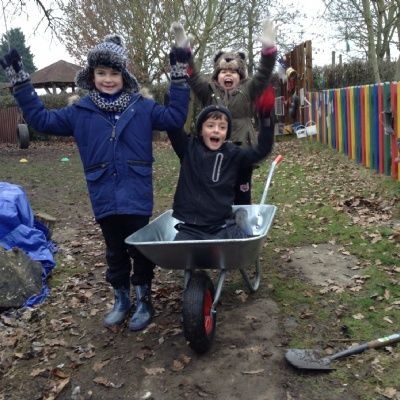Outdoor learning

Stacie Bourne has been looking into the impact of outdoor learning with a focus on Early Years
Last week I met with Mrs Antoine, Mrs Mackay and Miss Starr to talk about outdoor learning and how the recent improvements and new equipment in the school gardens had impacted on children’s learning and enjoyment.
As a school, The Hills Academy believes in the benefits of outdoor learning and hence provides a range of opportunities for pupils to experience a different learning environment in safe and supervised enclosed outdoor spaces within the school grounds that contain an array of equipment for further developing physical and social skills.
The staff explained that children find outdoor learning engaging and enjoyable and that it has a positive impact on behaviour, health and wellbeing. It offers children different ways to play, explore and express themselves as well as the chance to take risks and be challenged which is rewarding and can stimulate personal growth.
Outdoor learning also offers children a different setting in which to discover their potential, abilities and interests outside the classroom, and for some children who may be struggling or have additional needs, outdoor learning can inspire them to become more motivated and capable learners.
At The Hills outdoor learning is child-led within clear, safe boundaries. Children are able to make their own choices in terms of how they play, which allows them to use their initiative and imagination and adds to a sense of excitement when trying something new. It also allows for collaborative play to unfold and a team spirit to develop, particularly in sessions with mixed age groups such as Dragonflies.
Recent funding and improvements within the school grounds include extending the hard-standing area in the Nursery garden, thereby making their dedicated outdoor space more accessible throughout the whole year, and the installation of new wooden play equipment for the children in Reception.
As a result, children are able to spend more time outside. They are encouraged to make big movements and are not restricted to using their “indoor voice”. In addition, more children are able to play outside at the same time, which not only gives them a chance to work together in their play and improve their social skills, but it also means that a rotation of smaller focus groups can work inside with a teacher with fewer distractions.
Dragonflies also plays a significant role in the provision of outdoor learning within the school. Funded through pupil premium as well as the popular coffee-afternoons and resourcefulness of its dedicated staff, Dragonflies offers another important opportunity for child-led outdoor learning and collaborative play and has a positive impact on children’s social skills, behaviour and confidence for groups of 12 children at a time. This year, every child in school has had the opportunity to experience an afternoon at Dragonflies first hand, which they have all thoroughly enjoyed.
Looking towards the future, the Nursery garden would benefit from some further improvements to the grassy area so that it can also be used in winter, as for much of the year it is too muddy for small children. Dragonflies are hoping to raise enough money to be able to renovate the eco-dome, thereby increasing the option of allowing children to participate in sheltered activities when the weather is particularly bad.
It was clear to me that outdoor learning has many benefits and continued improvements to the gardens and resources will further increase pupils’ learning and enjoyment.
Many thanks to all the staff for their time and for explaining the role of outdoor learning within school.
